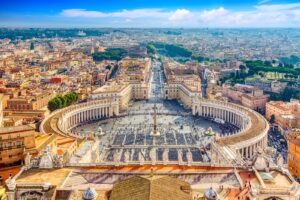May 17 marked the sixtieth anniversary of the Supreme Court’s decision in Brown v. Board of Education, in which the Court ruled that the government-mandated racial segregation of public schools was unconstitutional. The Brown decision is an icon of American jurisprudence and justly holds a towering position in our legal history. Its ruling was a long overdue moral triumph, and a watershed moment in the elimination of state-enforced racial segregation. While the rationale the Court offered for its decision remains controversial, the ruling itself now enjoys non-negotiable acclaim.
The occasion of Brown’s anniversary commends to us a remembrance of its necessity, and of the sad history of systemic injustice that gave rise to the case. But we also do well to consider the theological foundation for the civil rights movement’s prophetic indictment of the practice of segregation.
All Men Are Created Equal
The scandal of the Jim Crow regime was its repudiation of the truth (famously recognized in “that promissory note,” the Declaration of Independence) that all men are created equal and endowed by their Creator with unalienable rights that government must protect. Dr. Martin Luther King, Jr., elaborated this theme in his sermon of July 4, 1965, “The American Dream”:
Start your day with Public Discourse
Sign up and get our daily essays sent straight to your inbox.You see, the founding fathers were really influenced by the Bible. The whole concept of the imago dei, as it is expressed in Latin, the “image of God,” is the idea that all men have something within them that God injected. . . . And this gives him a uniqueness, it gives him worth, it gives him dignity. And we must never forget this as a nation: there are no gradations in the image of God. Every man from a treble white to a bass black is significant on God’s keyboard, precisely because every man is made in the image of God.
Thus, segregation is not merely inconvenient or inefficient. King thundered: “segregation is morally wrong and sinful.” He quoted the Apostle Paul, imploring all to recognize that “out of one blood God made all men to dwell upon the face of the earth.” Racial subjugation corrupts the law by employing it as an implement of injustice, and offends the God whose own wise designs are deemed grounds for oppressing His creatures. This is an ethical indictment resting wholly on biblical suppositions.
While the providence of race provides no ground for judgment, human behavior assuredly does. King’s dream, memorably, was that his children would “not be judged by the color of their skin but by the content of their character.” The distinction between race and conduct is basic.
Yet contemporary fashion inverts that tenet, and unaccountably equates moral judgments of conduct or policy with racial bigotry. A representative instance: President Obama, in his second inaugural address, associated Stonewall with Selma. That is, he equated the gay rights movement with the black civil rights movement. The president went so far as to propose that same-sex marriage is deducible from our being created equal. Even for a politician, that was a spectacular non sequitur.
Moreover, though rhetorically strategic, it is deeply cynical for this late stage of the sexual revolution to congratulate itself by assuming the mantle of the black civil rights movement, a movement that drew its moral resources from Christian precept. The orthodox expression of Christian faith is the sworn enemy of the sexual adventurism juggernaut. The containment of sexuality within covenanted procreative marriage is central to the historic order of Christian civilization. Destroying that norm is both the goal of the sexual revolution and a prerequisite to its remaking of social order.
Defining One’s Own Concept of Existence?
The sexual revolution repudiates the architecture on which our legal commitment to inalienable rights rests, recoiling from its authority, boundaries, and restraint on sensual exploration. In the new account, life’s meaning is not God-given and susceptible to communal apprehension, but stipulated by individuals for themselves. This is the offer presented in the infamous catechetical statement in the Supreme Court’s Casey abortion decision (later echoed in the Court’s invalidation of Texas’s homosexual sodomy prohibition): “At the heart of liberty is the right to define one’s own concept of existence, of meaning, of the universe, and of the mystery of human life.”
This move to deify the individual (for that’s what reality-defining authority entails) may at first seem to imply that individual’s definitions remain ever at risk of veto by the god next door. But so long as this Court is in session, its interventions continue to legally enshrine the concept of existence that condones libertine sexuality and abortion. These, after all, were the interests provoking the Court’s declaration of constitutional solicitude for individual whim. By purporting to liberate private choices, the Court was in fact crowning the public victors. The specious public-private divide is a rhetorical resort most useful in obscuring social-transformational moves.
The ascendant public regime consecrates public chaos in remaking marriage to eliminate from its essence the relation of husband and wife, and in reducing the biological relation of mother and father to child to an incidental manufacturing feature with no necessary relational meaning or responsibility attending it.
Which brings us to the belligerence of United States v. Windsor. There, the Supreme Court invalidated the federal definition of marriage as a union of a man and a woman, discerning the law so stating to be but codified insult and meanness. Well, of course.
Perhaps predictably, prominent legal scholars have compared Windsor to Brown. The Harvard Law Review, for one, recently published some examples. But Windsor’s intentional obscurity and departure from governing standards make it notoriously difficult to explain the ruling as anything other than the Court using the occasion to confirm that a reimagined world is upon us, and the standards operable in the old model are no longer cognizable.
Not so Brown. Whatever the weaknesses in the Court’s rationale for the outcome, Brown’s ruling nevertheless was consonant with Fourteenth Amendment text and history, and with the normative implications of creation imago dei that the black civil rights movement pressed in its remonstrances. Windsor is not of that world.
Is Human Dignity Conferred by the State?
It is a notable feature of Windsor that the “dignity” the Court attributed to same-sex couples given marital status is a state-conferred dignity, not an inherent one. That’s a curious innovation, but it makes sense in context, for two reasons. First, the Court was aiming, for the moment, to formally restrict its ruling only to federal acknowledgment of a marital status given by state law.
Second, the “state as dignity-source” is probably a design feature of the replacement worldview, bereft as it is of any other source for human dignity. In the aftermath of God’s banishment, our flexibility to remake humanity and its fundamental relations is accompanied by the sort of drawbacks one might expect when the universe is up for grabs—such as the loss of justification for much of our legal tradition. But that may take a while to come into clear view. The transition will proceed acceptably in the short term so long as we remain haunted by the biblical anthropology from which came our treasured concepts of equality and human dignity. For a time, we’ll recite the old principles through habit, if not principle. But that won’t endure, for their public plausibility ultimately depends on a critical mass sharing fidelity to their Source.
An abstract commitment to either “racial equality” or “what marriage is,” detached from the cosmology that yields and vindicates those truths and empowers their practice, will have no ultimate purchase. As Marcello Pera elaborates at length: “we should call ourselves Christians if we want to maintain our liberties and preserve our civilization.” Calvin Coolidge shared that conviction: “Unless the faith of the American in these religious convictions is to endure, the principles of our Declaration perish. We cannot continue to enjoy the result if we neglect and abandon the cause.”













